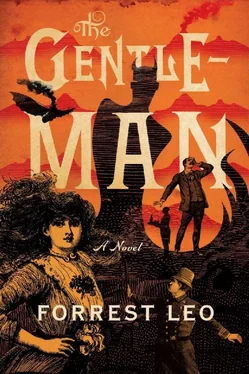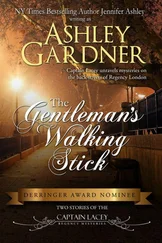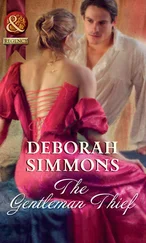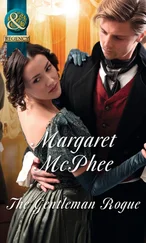Seeing her brother makes me think of Vivien differently. They look so similar that I could not help thinking of her as I watched him. They have the same unconscious grace. Why did I never notice it in Vivien before? It occurs to me that I did notice it, but that I preferred not to think of it after our courtship.
Briefly, I wonder what it would have been like to see Vivien without her clothes on our wedding night. Would she have moved with the same ease and grace then?
I banish the thought with something like panic. I will not think of it. I cannot. It will drive me mad. I focus on my feet. They move of their own accord, without conscious thought or effort or command from me. That is a marvellous thing. Why have I never before noticed what a marvellous thing that is?
I have not known where I am walking, but I know now. I need to see Tompkins. (Tompkins is my second sage. If Simmons is my Ector, Tompkins is my Merlin.* He owns a bookshop.) I cannot see my course through the fog, but my feet know the way. They skitter across the damp cobblestones, my heels clicking like hooves. I wonder if the Gentleman had hooves. I did not think to look.
I pass illuminated house-fronts which grin at me maniacally through the fog, gaslight blazing from their windows. It is a dark afternoon (the sun for sorrow will not show its face), and the lamp-posts are being lit. I tip my hat to the lamplighters. I hurry past the smell of clustered humanity. I still find perverse poetry in it all, even in the sewage in the gutters and garbage in the street. I do not know what is wrong with me.
Mine is a city in transition. Signs of Progress are all around me — the steel girders spanning the Thames, the omnibuses clattering by, the modern policemen standing on every corner of this modern metropolis — but still there is history beneath my feet, sneaking out from cracks between cobblestones and darkened alleys forgotten by the tide of time. I know of no other era when life was so exciting, unless it be the glory days of the Roman Republic.* We have the world before us, but have not yet outrun our past. It is a good time to be alive.
I walk through respectable neighbourhoods which turn abruptly into disrespectable ones. The respectable are quiet, on this foggy and inhospitable day. The disrespectable are noisy, for despite the weather it is a day like any other and there is work to be done. There is much a poet might learn from this. I pass into commercial neighbourhoods, which are even noisier than were the disrespectable ones. People are everywhere, and horses, and carts, and cabs, and policemen, and advertisements. I have no desire to purchase a new top hat, nor a miraculous spring-loaded shoehorn (my boring one serves just fine), nor a corset made with the bones of an elephant. I am bumped and jostled and sworn at. I bump and jostle and swear back, which is the only way to survive in a city such as this.
I am sweating by the time I reach the small shop. It is sandwiched between a haberdasher and an apothecary. Above the door a peeling sign says, ‘Phoenix Used Books And What Have You, Prop. Wm. Tmkns.’ The windows are crusted with a thick layer of soot, but I can just make out a flickering light inside. Tompkins reading by his hearth.
Abruptly I find myself face-to-face with Whitley Pendergast, who is leaving the establishment. ‘Hullo, old boy,’ I say, ‘the Hell are you doing here?’
‘Purchasing a racehorse,’ he replies automatically. ‘What else would I do in a bookstore?’
‘Thought you might’ve come to pick up Platitudes .* There’s a stack of unsold first editions that have been gathering dust in the corner for a month.’
‘Savage,’ says he, ‘words cannot express the acute pleasure I will feel when at last I drive my rapier into your belly.’
‘When that day comes, Pendergast, I’ve instructed my lawyer to hang a black banner from St Paul’s to mark the death of poetry.’
‘Speaking of poems, Savage,’ he says, ‘I’ve written you one just now. “The savage fool does vainly rage and cry / But foolish Savage imagines how he’ll die.”‘
‘Better a witty fool,’ I tell him, ‘than a foolish wit. Cheerio, old boy.’
He storms off into the night and I push open the door with my shoulder. Rusty hinges groan loudly in protest. Why the treasures of this magical cave are not more widely known I have never been able to conceive. It is the most marvellous place in the world. It should be the most popular spot in town; but I am glad that it is not.*
‘It’s Savage,’ I say, entering the shop. It is at first glance a tiny place, a narrow storefront barely wide enough for a door and a window looking out upon the street. But once your eyes grow accustomed to the gloom, you are able to see the teetering towers of books which vanish into the dusty darkness of the rafters, and that the room, though not wide, is very deep. Looking down the stacks it seems as though the shop has no end. It simply goes back, back, back, into some sort of musty, misty, magical hinterland of crumbling pages and lost knowledge. There’s a cat, too. Its name is Boadicea, and I do not like it. I do not like cats. They return affection with indifference. But even its presence cannot diminish my love of the shop.
Before the fire, engulfed by one of his colossal wing-backed armchairs, the ancient bibliophile himself sits squinting at dusty pages. He doesn’t look up. (The shop seems otherwise deserted, which is not uncommon. I do not know how it turns a profit, if it turns a profit. Perhaps Tompkins is fabulously wealthy and has never told anyone and runs the shop purely for the pleasure of it.)
‘Tompkins,’ I say, ‘I have a problem.’ I always call Tompkins ‘Tompkins.’ Once I tried to call him ‘Mr Tompkins’ and he threw a book at my head.
He continues to read. He is maybe two hundred years old, though to see the agility with which he climbs a ladder to reach a distant book would astonish you. His eyes are sunk deep within wrinkles, and are very dark and tend to glitter. His hair is perfectly white.
‘Tompkins!’
‘Eh?’ He turns a page. His voice is not as feeble as you would suppose, looking at its owner — he is a trifle deaf, and talks loudly.
‘Damn it, Tompkins, I need your help!’
‘I’m in the middle of a chapter,’ he complains.
‘I don’t care if you’re in the middle of a sentence!’
‘I am.’
‘Tompkins, something awful has happened.’
Grumbling, Tompkins lowers the book. ‘What do you want?’ he says, fixing me with a keen-eyed glare.
‘I need advice.’
‘I hope it’s worth the interruption.’
‘I am having peculiar feelings about my wife.’
‘Let me guess,’ he says without enthusiasm. ‘You hate her.’ (I often confide in Tompkins.)
‘Tompkins, I’m serious! I don’t know whether I hate her or not, that’s the trouble!’
‘Well, boy, we live in troublous times.’
‘Tompkins, I sold her to the Dev’l!’
‘The what?’
‘The Dev’l.’
‘Speak up, Savage, I didn’t quite catch that.’
‘THE DEV–ILL!’
‘Ah,’ he says, closing the book entirely. ‘And why did you do that?’
He doesn’t display any surprise at my pronouncement; only interest. That is something I especially like about Tompkins — he is never astounded by anything. I believe that is a by-product of living one’s entire life within books. He has read about every conceivable happening upon this earth, and so the notion that one might sell one’s wife to the Devil is not inconceivable. Indeed, it is even rather commonplace.
‘I didn’t mean to!’ I say. ‘It just happened . He dropped by to thank me—’
‘He did what?’ Tompkins says, intrigued. I believe he thinks more of me than he has hitherto.
Читать дальше












